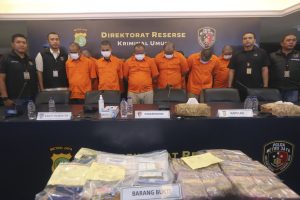How does someone come to sell a kidney?
In Indonesia, the answer to that question can be complex.
The thorny issue of organ donation has once again come to the fore as a result of a case involving police and immigration officers accused of working with human traffickers to send as many as 122 Indonesian nationals to Cambodia, where their kidneys were harvested for sale.
The case, which first hit the news in July, has now resulted in some 12 people being arrested in an effort to break a large transnational human trafficking syndicate. The victims apparently included teachers, factory workers, executives, and security guards, who all allegedly agreed to sell their kidneys in exchange for cash.
As Hengki Haryadi, the Jakarta police director for general crimes, put it, “Most of the victims lost their jobs during the pandemic and they agreed to sell their organs because they needed money.”
Damai Pakpahan, a feminist activist based in Yogyakarta, told The Diplomat that human trafficking occurs in Indonesia due to a multitude of factors that include lack of state intervention coupled with economic and educational challenges.
“Due to a shortage of work opportunities and poverty, people just believe online information or have low literacy,” making them vulnerable to scams, she said. “The government is not doing its mandate to protect the people and there are failed bureaucratic reforms, bribes and corruption that add to the problem.”
In a surprising twist to the tale, some nine of the suspects in the recent trafficking scandal were themselves former organ trade victims. In turn, they allegedly worked as recruiters and engaged social media to lure victims to travel to Cambodia where their organs were harvested at Preah Ket Mealea Hospital in the country’s capital Phnom Penh, and then transplanted.
According to Haryadi, the transnational trafficking group had been in operation since 2019 and had netted some $1.6 billion over the years, with each victim promised just $9,000 for a kidney.
One of the accused was a police officer from Bekasi, in addition to an immigration officer in Bali and 10 other traffickers, three of whom were operating in Cambodia. The police said that the immigration officer in Bali was a key component to the scheme, falsifying travel documents for the victims and receiving $200 per victim.
Paid organ donation has been prohibited by the World Health Organization (WHO) since 1987 and many countries around the world, including Indonesia, have local regulations that outlaw the sale of organs. Voluntary organ donation is legal in Indonesia for those over 18 years old who have permission from doctors and family members to make such a donation.
However, according to the WHO, some 5 percent of all transplants worldwide are illegal, with the live donation of kidneys listed as the most common form of illegal organ trade.
“Human trafficking networks that ensnare victims from among the poor by persuading them to sell their vital organs are rife in Indonesia. As an example, we have this network offering money by selling organs taken in hospitals not in Indonesia but in Cambodia,” said Gabriel Goa, the chairman of the non-governmental organization, the Advocacy Services for Justice and Peace in Indonesia (PADMA).
“Another modus operandi is that young Indonesians are lured to work abroad with very tempting salary offers. But the fact is that the promised ticket money, passport money and others turn out to be debts that need to be paid off. If the victims don’t reach their targets, their vital organs are sold instead,” he added.
“We have seen so many of these kinds of online scams that send Indonesians to the Philippines, Cambodia and Myanmar. This is an extraordinary type of crime across Southeast Asia.”
According to the United Nations Office on Drugs and Crime (UNODC), Indonesia’s geographical location and border weaknesses “exacerbate the country’s vulnerability to trafficking in person, drugs and natural resources, as well as smuggling of migrants.”
Indonesia is a major source country for trafficking in persons, the UNODC states, and “most victims are primarily trafficked for forced labour and debt bondage in other Asian and Middle East countries.”
One of the issues with human trafficking is that it can be a laborious crime to prosecute due to the transnational nature of the offense.
Wahyu Susilo, the executive director of Migrant CARE, the Indonesian Association for Migrant Workers Sovereignty, told The Diplomat that one of the problems with organ harvesting is that it is not just a transnational crime but “a transnational crime that preys on the ignorance of its victims.”
“These victims who sell their organs due to ignorance can also sometimes face criminal sanctions as a result of their actions,” he said.
He added that the line between legal donation and the illegal sale of organs can sometimes be blurred due to a lack of clear legislation on the issues.
Indonesia is a signatory of the Palermo Convention, or the United Nations Convention Against Transnational Organized Crime, a multilateral treaty from 2000 meant to tackle transnational organized crime, which the country signed into its own law in 2009. It is also a signatory to the ASEAN Convention Against Trafficking in Persons, Especially Women and Children, a regional, legally binding agreement between ASEAN states signed in 2015.
“However, we have seen a lack of effort on the part of law enforcement to implement these laws,” Susilo said of the legislation.
The suspects in the Indonesian case have been charged with human trafficking, which carries a maximum sentence of 15 years in prison and a potential $39,000 fine, while the immigration and police officers are facing additional charges relating to abuse of power and obstruction of justice.
Yet Goa of PADMA said that countries in the region need to do more and “unite to catch and suppress these transnational networks.”
“Heads of state and the police of Southeast Asian countries should immediately form a dedicated task force for the prevention and eradication of Southeast Asian human trafficking,” he said.

































